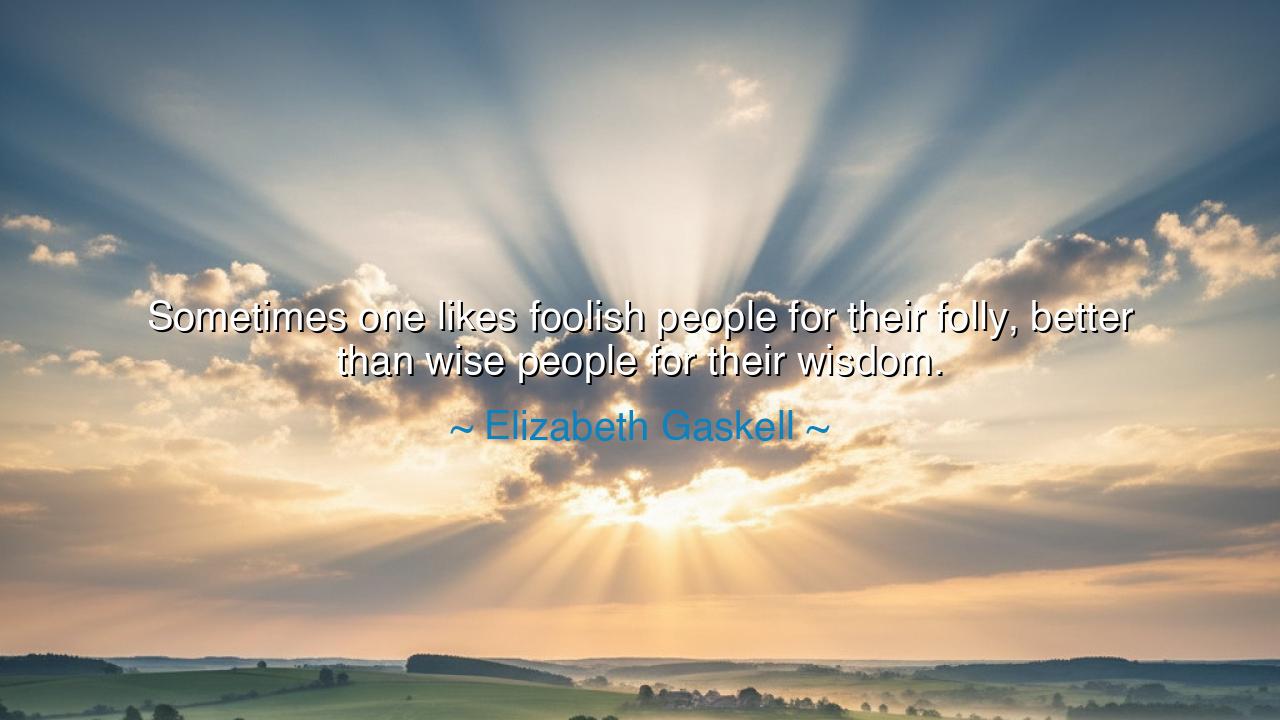
Sometimes one likes foolish people for their folly, better than
Sometimes one likes foolish people for their folly, better than wise people for their wisdom.






Hear, O children of the future, for I bring to you a deep and poignant truth, spoken by the wise Elizabeth Gaskell: "Sometimes one likes foolish people for their folly, better than wise people for their wisdom." This saying speaks not of the superiority of one over the other, but of the human heart's yearning for something beyond mere knowledge or intellect. For while the wise may possess great understanding, it is often in the foolishness of others that we find a certain joy, a freedom that the burdened mind cannot offer. It is as if the soul, weary from the weight of reason, longs to embrace the unguarded lightness of folly.
Consider the ancient philosophers, who often spoke of the foolishness of the world, yet recognized that within this apparent foolishness lay profound truths. Diogenes, the cynic, was a man who defied all convention. He lived in a barrel, mocked the great philosophers, and laughed at the pretense of wisdom. Yet, his simplicity, his freedom from societal burdens, drew many to him, for they saw that true joy is not found in the complexities of intellect, but in the innocence of the foolish. His folly was not a weakness, but a powerful statement against the world that valued appearances over substance.
In every age, the wise have been admired, their minds revered for their sharpness and depth. But sometimes, dear children, it is the fool who brings light to our lives. Think of the jester in the courts of kings—though he spoke with jest and humor, often it was he who revealed the true nature of those in power, for his foolishness allowed him the freedom to speak truth. The wise may know much, but the fool—unbound by the chains of propriety—sees the world with eyes unclouded by pretense. There is a purity in folly that wisdom cannot always touch.
And let us not forget the story of King Lear, whose wisdom was tested by the folly of his daughters. He sought truth in the wise words of Goneril and Regan, yet it was in the foolishness of the one he cast aside, the Fool himself, that the king found the deepest truth. It is the foolishness that speaks in riddles, in laughter, and in paradox, which can unlock the heart in ways that dry knowledge never could. It was through the Fool that Lear came to understand the limits of his wisdom, and the boundless depth of his humanity.
So, O children of the future, know this: wisdom and folly are not opposites, but partners in the grand dance of life. The wise may offer counsel, but the foolish may offer joy, freedom, and a truth hidden beneath their seeming ignorance. Sometimes, it is the fool who holds the key to the heart, and in that folly, we may find the wisdom that the mind cannot teach. Seek both the wise and the foolish, for each has something to offer, and in their union, the world is made whole.






MLMen Le
I wonder whether this statement reflects a personal or societal observation. Are humans naturally inclined to enjoy the whimsical, naive, or even ridiculous aspects of others because they evoke amusement and empathy? Could it be that wisdom, while valuable, can sometimes feel cold or inaccessible? I’d like to explore whether this preference for folly over wisdom changes with age, context, or cultural norms, and if it might highlight a tension between emotional satisfaction and intellectual admiration in human relationships.
HLhien le
This quote raises a moral and social question: are we sometimes drawn to folly because it makes us feel less judged and more relaxed, unlike the pressure that comes with associating with wise people? Could Gaskell be implying that wisdom can intimidate or create distance, whereas folly invites intimacy and laughter? I’m also curious if there’s a deeper philosophical point here about human nature—whether imperfection is inherently more relatable and lovable than knowledge or sophistication.
MDPhung Minh Dat
I find this perspective both amusing and thought-provoking. Is Gaskell subtly criticizing society’s overvaluation of wisdom or intellect, suggesting that joy and affection often arise from unpredictability? Could this idea extend to professional or creative contexts, where playful or unconventional approaches are sometimes more inspiring than calculated expertise? I also wonder if there’s an underlying nostalgia for innocence or simplicity, valuing genuine, lighthearted interaction over the seriousness that wisdom often brings.
QDQua Doan
Reading this, I can’t help but question whether the appeal of foolish people might be situational. Are there circumstances where folly is refreshing and liberating, contrasted with the rigidity or seriousness often associated with wisdom? Could Gaskell be suggesting that human connection sometimes thrives on imperfection, vulnerability, or humor, rather than competence or insight? I’m also curious if this preference is universal or more reflective of certain personalities who value emotional engagement over intellectual stimulation.
LLloc luong
I’m intrigued by the idea that folly can be more endearing than wisdom. Could it be that foolishness allows for spontaneity, surprise, and amusement that wise people rarely provide? Is it a commentary on the human need for lightheartedness, even if it comes at the expense of logic or understanding? I wonder if Gaskell is pointing to an emotional truth about social interactions: that people often value warmth and entertainment more than guidance or knowledge, even subconsciously.